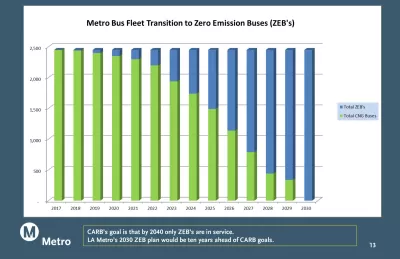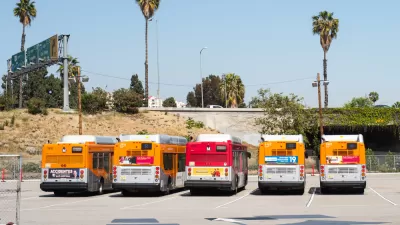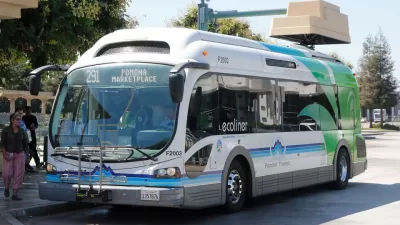The move is risky. The agency has no electric buses now, and the last ones it operated performed so badly they had to be returned. The plan is to make the transition in phases, and hope that battery technology improves.

"Metro announced it plans [on June 15] to begin phasing out its 2,200 natural gas buses and replace them with electric battery engines by 2030," reports Emily Guerin, environment reporter at KPCC, Southern California Public Radio. An audio version of the article is embedded.
Unlike smaller Southern California transit agencies, such as Foothill Transit and Antelope Valley Transit Authority, that currently operate electric buses and plan to expand, Metro's only experience with battery-electric buses has been poor.
The agency bought five electric buses from Lancaster-based bus manufacturer BYD a few years ago, but was so disappointed with the results that BYD bought them back.
Furthermore, there are limits to the technology that Metro hopes will improve to make the transition possible.
John Drayton, Metro’s head of vehicle technology, said there's not currently an electric bus on the market that can meet Metro's needs for its rapid or local service, where buses run 250 miles a day. “We think those vehicles will become available around 2020 or 2022,” he said.
“I worry all the time,” he said, laughing. “This is not a comfortable 'go and buy buses that have been driven for 12 years and are service proven.' We’re going into new territory here.
But the air quality benefits will be quantifiable.
Electric buses have 30 percent fewer greenhouse gas emissions and 20 percent fewer smog-forming nitrogen oxide emissions than the cleanest natural gas bus, according to the Union of Concerned Scientists. (The natural gas industry disputes this.) And as the California power grid becomes more reliant on renewable energy and less on fossil fuels.
And so are the costs, estimated at "$3 billion needed to switch over Metro’s entire fleet and build charging infrastructure."
According to Steve Hymon, who writes The Source column for L.A. Metro, new electric and near zero-emission compressed natural gas buses may be ordered soon:
•Metro is asking its Board this month to approve the purchase of 35 60-foot electric buses for the Orange Line — the goal remains to convert the Orange Line to fully electric buses by 2020 while also putting electric buses on the Silver Line.
•Metro is also asking the Board to approve buying 295 40-foot CNG buses, some of which will replace diesel buses operated by Metro contractors. CNG burns much more cleanly than diesel.
According to Joe Linton of Streetsblog LA, Metro staff is recommending that the agency contract [for the electric buses] with bus manufacturer New Flyer, a company with which Metro has a history of bus purchases. New Flyer is expected to manufacture buses at its plant in Ontario, in nearby San Bernardino county."
The payoff could transcend reduced emissions by Metro alone, asserts Denny Zane, the executive director of the public transit advocacy group Move LA.
“You need to treat your role as a proving ground for durability, reliability, costs and other factors for the heavy-duty vehicle industry generally, not just for your fleet or for buses,” said Zane. “This is a much a bigger issue for you to ponder.” [Also see his op-ed.]
Related in Planetizen: Transit Agencies Move Toward Electric Buses, June 5, 2017: Transit agencies from Washington to Florida are beginning to make the switch from diesel and natural gas-powered buses to battery electric buses.
Hat tip to L.A. Transportation Headlines.
FULL STORY: Metro Wants To Fully Transition To Electric Buses By 2030

Planetizen Federal Action Tracker
A weekly monitor of how Trump’s orders and actions are impacting planners and planning in America.

Congressman Proposes Bill to Rename DC Metro “Trump Train”
The Make Autorail Great Again Act would withhold federal funding to the system until the Washington Metropolitan Area Transit Authority (WMATA), rebrands as the Washington Metropolitan Authority for Greater Access (WMAGA).

The Simple Legislative Tool Transforming Vacant Downtowns
In California, Michigan and Georgia, an easy win is bringing dollars — and delight — back to city centers.

The States Losing Rural Delivery Rooms at an Alarming Pace
In some states, as few as 9% of rural hospitals still deliver babies. As a result, rising pre-term births, no adequate pre-term care and "harrowing" close calls are a growing reality.

The Small South Asian Republic Going all in on EVs
Thanks to one simple policy change less than five years ago, 65% of new cars in this Himalayan country are now electric.

DC Backpedals on Bike Lane Protection, Swaps Barriers for Paint
Citing aesthetic concerns, the city is removing the concrete barriers and flexposts that once separated Arizona Avenue cyclists from motor vehicles.
Urban Design for Planners 1: Software Tools
This six-course series explores essential urban design concepts using open source software and equips planners with the tools they need to participate fully in the urban design process.
Planning for Universal Design
Learn the tools for implementing Universal Design in planning regulations.
Smith Gee Studio
City of Charlotte
City of Camden Redevelopment Agency
City of Astoria
Transportation Research & Education Center (TREC) at Portland State University
US High Speed Rail Association
City of Camden Redevelopment Agency
Municipality of Princeton (NJ)





























